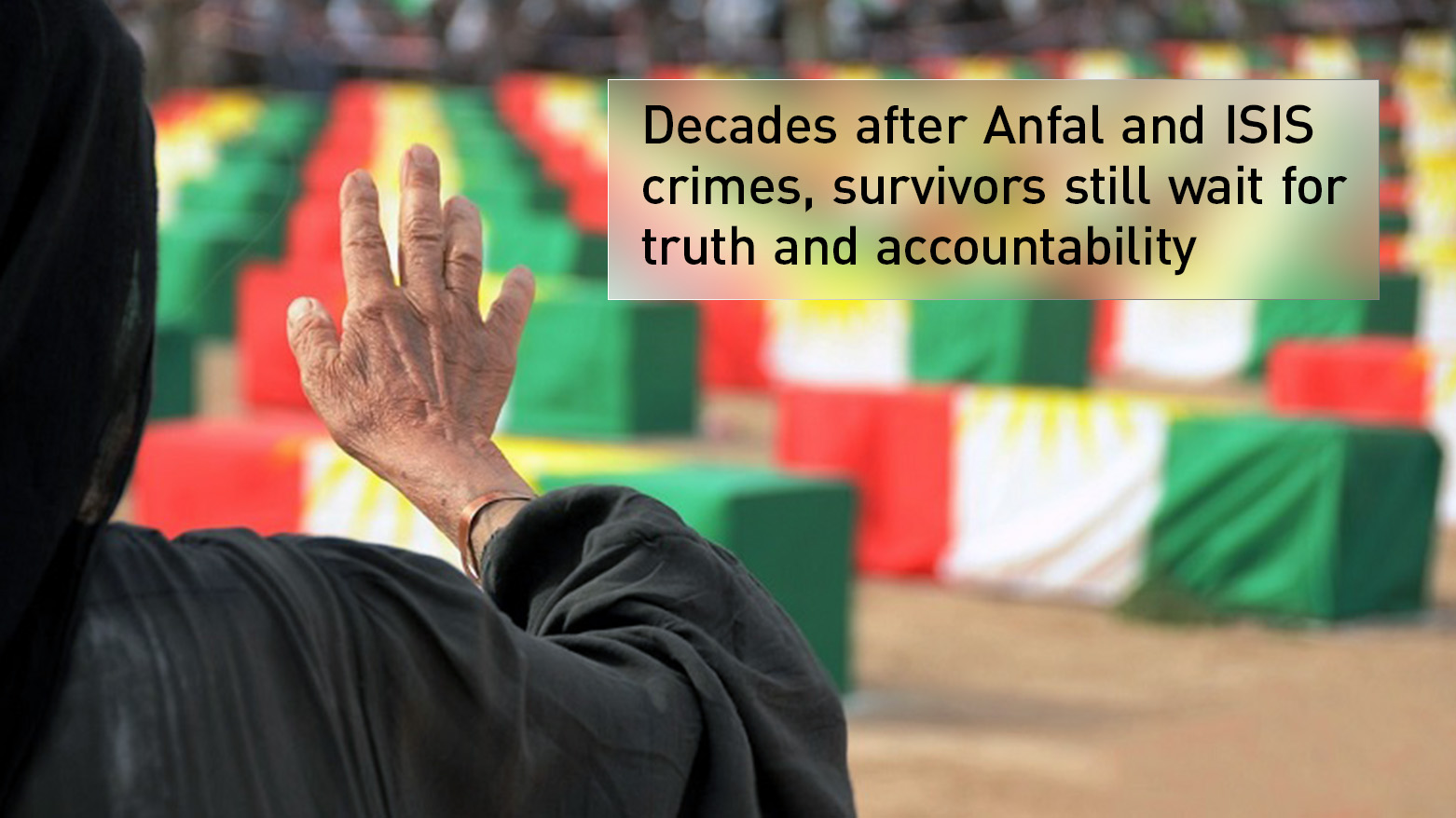KRG Marks International Day of Victims of Enforced Disappearances, Urges Justice for Anfal and ISIS Survivors
On the International Day of the Victims of Enforced Disappearances, the KRG urged Baghdad and the international community to deliver justice for thousands of Anfal and ISIS victims still missing.

ERBIL (Kurdistan24) — On the International Day of the Victims of Enforced Disappearances, observed annually on August 30, the Kurdistan Regional Government (KRG) renewed its call for justice, documentation, and accountability for thousands of victims of enforced disappearances throughout Kurdistan’s modern history.
Dr. Dindar Zebari, the KRG Coordinator for International Advocacy, highlighted that Kurdistan’s diverse communities—including Kurds, Yezidis, and Feyli Kurds—have endured some of the gravest atrocities of enforced disappearance.
He recalled the mass disappearance of Feyli Kurds in the 1980s and 1990s, the Anfal campaign that claimed the lives of 8,000 Barzanis and 182,000 Kurds from Badinan and Garmiyan, as well as the crimes committed by ISIS against Yezidis and other minorities, thousands of whom remain missing to this day.
Sacrifices and Rescue Efforts
Dr. Zebari underlined the sacrifices of the Peshmerga forces in the liberation of Yezidi areas, particularly Shingal, where the battle against ISIS cost the lives of 1,814 Peshmerga, wounded 10,725, and left 44 still unaccounted for.
He also detailed the KRG’s ongoing efforts to rescue abducted Yezidis after ISIS’s 2014 campaign of genocide. Out of 6,417 Yezidis abducted, 3,590 have been rescued, while 2,827 remain missing. To support survivors, the KRG has facilitated psychological and social assistance for 2,848 individuals.
Documentation and Accountability
According to Dr. Zebari, documenting crimes and enforced disappearances has been a central priority. As of June 1, 2025, the KRG has registered 2,991 cases, submitted 3,290 reports, and documented 3,090 victims of enforced disappearance. These files are intended both to preserve evidence of atrocities and to support international advocacy efforts for accountability.
However, Zebari stressed that international organizations have yet to adequately document these crimes, a step he described as crucial for ensuring the rights of victims and their families. He also criticized the federal government of Iraq for failing to establish effective mechanisms to leverage international instruments in addressing the issue.
Call for Justice and Compensation
In his concluding remarks, Dr. Zebari reaffirmed the KRG’s commitment to supporting the families of victims of enforced disappearance, particularly survivors of the Anfal genocide and the broader crimes of the Ba’ath regime. He emphasized that the Iraqi federal government must uphold its constitutional, legal, and moral responsibilities by providing justice and compensation to affected families.
“The people of Kurdistan have suffered immensely under systematic campaigns of enforced disappearance and genocide. Their rights must be protected, their stories documented, and their families compensated,” Zebari said.
From Documentation to Justice: The Missing Link
While the KRG highlights its efforts in documenting and rescuing victims, questions remain over the lack of meaningful progress at the federal level and the silence of much of the international community.
Nearly four decades after the Anfal genocide, survivors and families of the disappeared continue to wait for full recognition and reparations. Baghdad has repeatedly pledged to address the issue, yet concrete mechanisms for compensation or transitional justice have stalled amid political disputes, financial constraints, and a lack of will.
International organizations, meanwhile, have often focused on immediate humanitarian relief without sustaining long-term programs to document crimes or pressure the Iraqi state to deliver justice. This gap has left victims’ families in limbo—caught between promises of action and the reality of continued neglect.
For many families of the disappeared, annual commemorations serve as reminders not only of their suffering but also of the slow pace of accountability and the international community’s failure to translate symbolic recognition into practical justice.
In this context, Dr. Zebari’s call for justice underscores a deeper frustration: that decades after enforced disappearances became a defining trauma of Kurdistan’s modern history, both Baghdad and the international community have yet to provide a comprehensive path toward truth, justice, and reparations for victims and their families.
